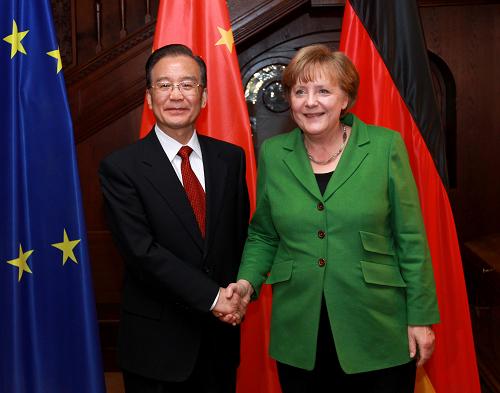Wen's visit highlights strategic ties
 0 Comment(s)
0 Comment(s) Print
Print E-mail China Daily, April 23, 2012
E-mail China Daily, April 23, 2012
Premier Wen Jiabao started his sixth trip to Germany on Sunday, a visit that will enhance the strategic partnership with Europe's largest economy and reaffirm China's contribution to measures tackling the EU debt crisis.
 |
|
Chinese Premier Wen Jiabao and German Chancellor Angela Merkel meets on April 22, 2012 in Hannover, Sunday.?[Xinhua photo] |
The topic was expected to come up as German Chancellor Angela Merkel accompanied Wen to the Hannover Messe, a major technology fair, on Sunday, and to a China-Germany business summit and a tour of Volkswagen headquarters on Monday.
"The fact that Wen will meet Merkel just two months after he received her in Beijing, in February, shows the importance and maturity of the China-Germany strategic partnership," China's ambassador to Germany Wu Hongbo said. The two leaders are expected to hold discussions even in the vehicle taking them to Volkswagen headquarters in Wolfsburg on Monday.
China and other emerging economies have pledged to contribute $68 billion at the International Monetary Fund's annual spring meeting in Washington on Friday, provided that the IMF does not back down from a 2010 agreement to give them more say in how it is run.
The reforms will increase China's voting rights from 3.65 percent to 6.4 percent.
Germany, with the lion's share in a $200 billion commitment to the eurozone, may press China to contribute more to help the EU, its No 1 trading partner.
Wen is expected to refrain from elaborating on the subject in a speech at the Hannover Messe on Sunday, saying only that the financial crisis is not over and that the road ahead for economic recovery remains a tough one.
"The overexpansion of the virtual economy and its disconnect from the real economy in some developed economies is an important cause of the global financial crisis," Wen is expected to say, according to a press release from the Foreign Ministry.
More manpower, money and resources should be poured into the real economy to aid global recovery, he is expected to say, citing China and Germany as models in fighting the crisis.
Ambassador Wu said that the two economies benefit from closer interaction. "The Chinese and German economies are highly complementary. China boasts a great number of medium to lower-level industrial and mechanical processing products, while most German industrial products are high-end, high-tech and high value-added."
Berlin's core industries - auto, petrochemical and electronics - have all established a market in China, he said.
"In our pursuit of transforming the model of economic development and improving technology, Germany is a very good partner," Wu said.
"It is in this context that Germany chose China as the partner country for the Hannover Messe this year. China is also willing to showcase its industrial development."
Wen, in his Sunday speech, is expected to urge industrial firms to cooperate more.
As the biggest economies in Asia and Europe, China and Germany have set a good example, said Zhao Junjie, an expert on European studies at the Chinese Academy of Social Sciences.
"Germany is a navigator and guide in China-EU relations," Zhao told China Daily.
Zhao expects more policies facilitating cooperation to come out after the Hannover Messe.
At $170 billion, Sino-German trade exceeds China's trade with the United Kingdom, France and Italy combined.
Germany, as Beijing's top trade partner in the EU, has made more technology transfers to China than any other Western power.
Zhao said close cooperation between China and Germany is also important to boost EU recovery.
Germany is the second leg of Wen's eight-day trip to Europe that began in Iceland on Friday. He will arrive in Sweden on Monday and Poland on Wednesday.
Wen's trip is one in a series of high-ranking Chinese leaders visiting Europe.
Vice-Premier Li Keqiang is set to start a weeklong visit to Russia, Hungary and Belgium from Thursday.
Li Changchun, a member of the Standing Committee of the Communist Party of China Central Committee's Political Bureau, has just concluded a four-day visit to the UK.
"China and EU relations have entered a period of growth," Zhao said, referring to increased high-level visits.
The EU's 2020 strategy and China's 12th Five-Year Plan (2011-15) have also seen close ties develop, especially in new energy, science, technology and investments, Zhao said.
Wang Yizhou, associate dean at the School of International Studies in Peking University, noted that China and the EU should reduce anomalies in their relationship.
The EU wants China to help resolve its debt crisis, while refusing to recognize China's market economy status and initiates anti-dumping cases, Wang wrote in a recent article.
This approach will only have "negative effects on relations," Wang said.





